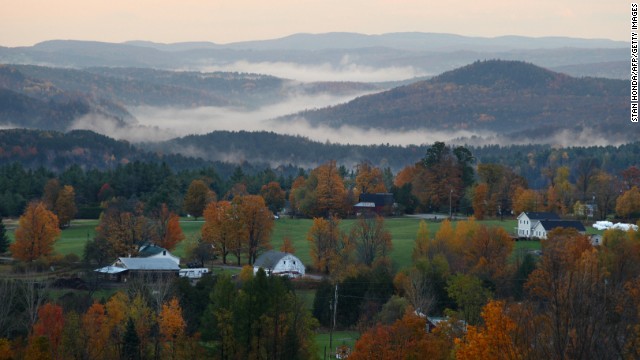Religion
Related: About this forumWhy Vermont is not Godless

Only 22% of Vermonters polled called themselves "very religious." But Jay Parini says many in his state are still spiritual seekers.
By Jay Parini
Editor's note: Jay Parini, a poet and novelist, teaches at Middlebury College. He has just published "Jesus: the Human Face of God," a biography of Jesus.
updated 5:18 PM EDT, Tue March 18, 2014
(CNN) -- Once again a new Gallup Poll has reported that Vermont is the least religious state in the country, with only 22% of the people willing to call themselves "very religious." On the other side of the poll, there is Mississippi, where a whopping 61% of citizens lay claim to that self-description. But what does it really mean to be "very religious" and not just spiritual?
I've been living in Vermont for much of my adult life, adding up to nearly four decades. And I've been keenly interested in the question of religion, having written a biography of Jesus and practiced Christianity as best I can for much of my life. I've also traveled in the South quite often, and understand where that 61% comes from: Not long ago I drove across Mississippi, and I couldn't find a secular radio station on the dial. It was all preachers, all sounding alike. Repent, repent, repent. Billboards everywhere shouted religious slogans. It seemed there was a church on every street corner in every town I passed through.
So what's going on here? Do Mississippians have a direct line to the divine? Don't the majority of people of Vermont also have an interest in religion or belief in God? Is this why Vermont was the first state in the union to allow for civil unions? And does secularism run rampant here?
On any given Sunday, while I'm sitting in church, many of my neighbors are out walking in the woods, skiing, or reading a book by the woodstove (it's what we do in Vermont). Indeed traditional churches in Vermont struggle to fill their pews, and one often sees churches being sold off to real estate developers, who convert them into apartments or places where secular business can take place under high ceilings that once filled with prayers.
http://www.cnn.com/2014/03/18/opinion/parini-vermont-religion/
AtheistCrusader
(33,982 posts)Why bother when you can claim 'most' and 'From what I can tell'.
Many of the things he identified as 'spiritual' don't seem connected at all.
"The community spirit is strong in this state, and the value of helping one's neighbor is cherished here as much as anywhere."
So bloody what. Religious sentiment has no monopoly on any of that.
"yoga classes"
Potentially, but not necessarily spiritual at all. I do yoga. I'd be just as happy doing it to death metal, as I would the sound of waves lapping a beach with tinkling freakin' bells. I don't 'meditate' when I'm working on balance and eccentric contraction/bodyweight strength training.
The author's entire article seems bent on a classic dismissal technique: the strawman. The poll said 'LEAST RELIGIOUS'. Not atheistic. Not least spiritual. None of that shit. So the author focuses on elements of things that can be interpreted as 'spirituality' in vain. Nobody said they weren't. Except him of course.
"Gallup classifies Americans as very religious if they say religion is an important part of their daily lives and that they attend religious services every week or almost every week. More than four in 10 Americans nationwide (41%) fit this classification in 2013. Twenty-nine percent of Americans were nonreligious, saying religion is not an important part of their daily lives and that they seldom or never attend religious services. The remaining 29% were moderately religious, saying religion is important in their lives but that they do not attend services regularly, or that religion is not important but that they still attend services."
rug
(82,333 posts)At least most of them aren't.
AtheistCrusader
(33,982 posts)Do you believe that saying a people are 'least religious' out of a superset population, based on the criteria that Gallup used, means the people are NOT SPIRITUAL?
I see zero correlation between the two claims.
People can be 'spiritual' about orgasms, downhill skiing, and fancy cupcakes. It's a subjective meaning to THEIR individual, unique experience.
I'm probably the least religious person you could ever hope to meet. Doesn't mean that I don't have experiences that some would call 'spiritual' in nature. Put me behind the controls of an aircraft? Feel the hydraulics pressing on the ailerons, the rudder, the elevator, pressing into the slipstream, moving the craft in response to my whim, the thrum of the engine's RPM's through the body of the plane, you bet. Any observer would call my response to that experience 'spiritual', and I'd be hard pressed to deny the classification. Because in fact, it doesn't imply 'religious'.
rug
(82,333 posts)Part of the problem is the word spiritual itself. There are profound human emotions and experiences that do not need a reference to spirits.
AtheistCrusader
(33,982 posts)I don't recognize the basic existence of a soul or spirit at all, yet there are things I would describe as 'spiritual' in nature, and this seems common in western nations.
The second group in the Gallup poll is the important catch-all for people whom religion is a 'thing', but do not actively attend explicitly religious services and, I think, satisfies the authors objection.
cbayer
(146,218 posts)religiosity and poverty?
People in Vermont may be in a much better position to attend meditation groups or yoga classes, and give their time and money to social welfare and environmental causes.
Measuring how often someone attends church is much easier than measuring the degree to which they feel spiritual, and the author does a good job of making the case for spirituality probably not being that different in Vermont than it is in Mississippi.